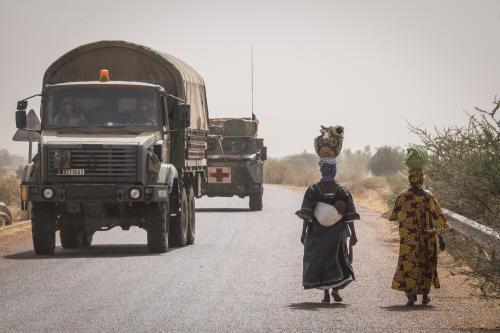The mass kidnapping of girls has brought the Nigerian Predicament to global attention. The insistence by Nigerian authorities that these and other incidents reflect global terrorism is not the full story. For a long time, Boko Haram was portrayed as a local phenomenon. Now it is depicted, most recently in a UN Security Council resolution, as an al-Qaeda affiliate. There is more conjecture than hard knowledge about this elusive entity.
Two years ago, I cautioned about a “band of insecurity from northeast to northwest Africa…that is likely to experience increasing instability and warfare, while narratives of jihadist revolt and terrorist technologies circulate.” That concern is now a reality. As western security forces are drawn further into counterterrorist operations in Nigeria, broader policy reflections are needed. Here are several points for consideration:
- The schism in Nigeria between a predominantly Islamic north and predominantly Christian south is growing more complicated. This division cuts across much of west Africa and some of central Africa. While most northern Nigerian Muslims oppose the brutal terrorist methods of Boko Haram, the latter taps into wide disenchantment over their shrinking share of the national economy.
- Boko Haram is retrograde in its ideology but disruptive in its structure and tactics. It draws on a long history of jihadist upheavals in northern Nigeria and a tradition of alternating between quietism and activism.[1] The nature of its operations, hundreds of miles apart, suggests a self-organizing capacity among groups that can act independently of one another and of centralized direction.
- What happens when the search for the abducted girls ends, with any of a number of possible outcomes? Counterterrorist operations by western nations, led by the United States, France, and Britain are steadily expanding in Africa.[2] A long-term agreement for an enlarged American base was recently signed in Djibouti. France has for decades maintained military bases in west and central Africa. Is the U.S. heading in this direction? Now that Nigeria has lowered barriers to external military engagement, will a strategic zone of operations emerge in the eastern Sahel as is the case further west in Niger, Mali, and Mauritania?
- What are the implications for Nigerian politics and nationhood? Nigeria may be a flawed democracy, but it has adhered to democratic forms, if not their substance, for fifteen years, 1999-2014. The 2011 elections were followed by massive rioting in the northern states, and targets included the religious and political establishment. The predecessor of the current president, Goodluck Jonathan, was a feeble member of this establishment who owed his rise to the top, as Jonathan himself, to the former military and then civilian head-of-state, Olusegun Obasanjo. Nigeria has been unsettled politically since Obasanjo was blocked from competing for a third term in 2007. The more the current government seems incapable of stemming terrorist attacks, the more threatened the political system will become. Even with the heavy casualties from terrorist and security operations, much more is at risk if the government’s impotence persists. Regional, ethnic, religious, and political fault-lines are already aggravated by discordant development.
- In November 2013, the U.S. State Department placed Boko Haram on the list of foreign terrorist organizations after years of resisting this step. Attempts to draw America into Nigeria’s religio-political vortex include the failed mission of the “underwear” bomber, Umar Farouk Abdulmutallab, on Northwest Airlines 253 as it approached Detroit on Christmas Day 2009. France has returned to a vigorous role in African security as witnessed by its engagements in the Central African Republic, Ivory Coast, Libya, and Mali. Will the U.S. take part in counterterrorist operations over the extensive area of attacks attributed to Boko Haram? Will it be drawn into rebuilding the hapless Nigerian military? Is it prepared for a blowback from radicalized Islamists beyond Boko Haram? In short, can this tactical operation become the wedge of wider American military involvement in Nigeria and its neighbors?
- Islamic terrorists have conducted many atrocities in the last five years. They could not have anticipated the extraordinary global response to the abduction of the school girls. Ensuring that this response does not generate catastrophic consequences requires greater policy debate. No one but the jihadists would benefit from the violent fracturing of Nigeria. The international community has responded to the tragic kidnapping with great sympathy and the insertion of national security teams. In light of the wider challenges, it may soon be asked: Is this enough?
[1] A helpful summary is provided in John Campbell, Nigeria: Dancing on the Brink (2nd edition, 2013).
[2] See Eric Schmitt, “Elite U.S. Troops Helping Africans to Fight Terror,” The New York Times, May 27, 2014.
The Brookings Institution is committed to quality, independence, and impact.
We are supported by a diverse array of funders. In line with our values and policies, each Brookings publication represents the sole views of its author(s).




Commentary
Confronting Boko Haram and the Nigerian Predicament
May 28, 2014